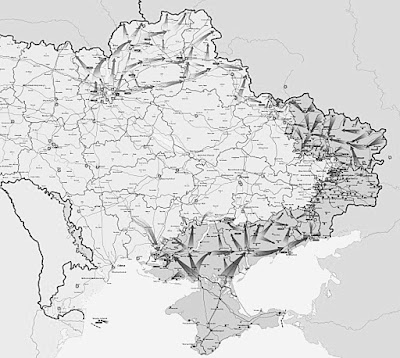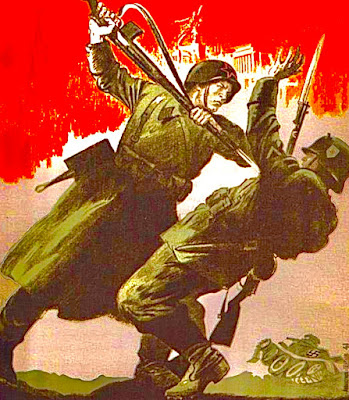There’s an incurable detachment between the reality of the global class struggle, and the illusory view of the world that America’s “left” is always going to cling to. Therefore for revolution to come to the imperial center, the class struggle here will need to be guided by something other than its current default representatives. There will need to be a reconstruction of the communist movement, which is distinct from the left in that rather than merely being the more progressive wing of the liberal order, it’s an enemy of the liberal order. At least with sufficient ideological struggle and development, the communist movement will become unified in principled opposition towards imperialism. So is not the case for “the left,” which will always be a place for pro-imperialist opportunists to build their hollow brands. “The left” is a big tent for every servant of empire who claims to identify with it, whereas communism, when successful, is inherently anti-opportunist.
It’s anti-opportunist because it’s capable of building a working class movement within the USA that functions in unison with the global working class movement. Communism has no place for the pro-imperialist left’s endorsement of State Department narratives, such as the fictitious Chinese persecution of Uyghurs or the psyop about Russia’s Ukraine intervention being unprovoked. Being a communist necessitates that one decide to think critically about what the imperialist media says, because communism’s interests lie with the anti-imperialist movement. Not with the opportunistic projects which define the left in this country.
Vijay Prashad, who spoke at the Party for Socialism and Liberation’s recent conference on the need for peace negotiations with Russia, has identified a deeper issue that shows why communists have this innate advantage in their analysis. He notes that “The modes of thought that come from North American positivism – game theory, regression analysis, multi-level models, inferential statistics – are at a loss to offer a general theory of our condition.” Our left, mired in imperialist interests, can’t grow beyond understanding the world through these kinds of frameworks, which all look at the symptoms rather than the cause. It’s Marxism that seeks to investigate the material interests driving today’s crises. So is not the case for the ideas Prashad writes about, which he observes aren’t capable of finding answers to our most important questions:
Can they explain the relationship between the endemic crisis produced by globalisation, the failure of neoliberalism to manage this crisis and the emergence of neofascism as its current consensus? Do they have the concepts – such as imperialism – that are essential to an investigation of the real world that we live in and not the illusory world dreamt up by the first principles of bourgeois social science? Can we understand why the North Atlantic Treaty Organization (NATO) wants to bomb this country or why the International Monetary Fund (IMF) wants to extract its pound of flesh from that country? Do they have an explanation for why the countries of the world spend more money on the arsenal of repression than on the production of social goods, why there are more police on our streets than social workers and artists?
Once you understand that imperialism is the primary source of systematic inequality in the modern world, and that everything our ruling institutions do is therefore foremost prioritized around aiding imperialism, you can correctly identify how to conduct yourself as a revolutionary. You can see that there’s a reason why the media says the things it does about Ukraine, about north Korea, about China, about Iran, about Syria, and so on. Upon learning Marxism, you learn to reject the misleading ideas that are put forth about these places. You also learn to think of workers liberation in the core within a global context. Socialism can’t come to this continent until neo-colonial extraction is ended, therefore combating it is paramount for a socialist in the core.
The anti-Marxist facets of the left oppose neo-colonialism only in the abstract. When it comes to the countries that have broken free from neo-colonialism, they’re selective in which ones they support, and it’s not their impulse to defend them from imperialism’s propaganda. They may stand with Cuba, while repeating the narrative about the DPRK being undemocratic, even though these two countries share all their essential qualities. They may give credit to Vietnam while repeating the atrocity propaganda about China, even though these two countries have the same political-economic system and are increasingly unified. This is not a serious way to conduct oneself as a student of class struggle, which is why the left in the core doesn’t require one to be such a student. It only requires as much as signalling one’s identification with the social justice causes of the day, without consideration for how these causes are themselves tied to the success of the anti-imperialist cause. Without the defeat of imperialism, the state within the core that perpetuates racial, gender, sexual, and other types of oppression won’t as easily become weak enough to be defeated. Which is also a goal that the imperialism-compatible left isn’t unified behind, as the social democrats don’t seek to overthrow the bourgeois state.
On the opposite end of the spectrum from the rightist-oriented social democrats are the ultra-leftists, who grasp that class struggle needs to be taken seriously while rejecting serious anti-imperialism. They don’t see how it’s a progressive development for Russia to neutralize Washington’s proxy war state in Ukraine, or for the PRC to take away Washington’s economic hegemony. Since countries like these became strong enough to geopolitically challenge imperialism, the ultras have invented a new definition of imperialism that’s designed to encompass the semi-peripheral countries, a category that Russia and China fall into. This definition considers any kind of international trade or military operations to be imperialism, disregarding the essential quality of modern imperialism: export of capital in order to let the exploiter countries economically feed off of the exploited countries. They claim this criteria is fulfilled by Washington’s challengers, but this idea is based on the same analysis of the imperialist pundits who’ve spun a mythology about a Chinese “debt trap” in Africa. It’s not scientific, it’s dogmatic.
It’s unscientific because it’s detached from an analysis about the forces that are bringing the globe closer towards a new wave of revolutions. Because it discounts the steps needed for realizing global workers liberation. Multipolarity is not the end goal for communists. It’s only a way of getting to the end goal, which is a scenario where imperialism has been weakened enough for the imperialist governments to no longer delay revolutions in the core nor the periphery. In that scenario, the United States and its imperial partners will no longer exercise the control which lets them continue to exploit the formerly colonized world. The currently exploited countries will have ended their servitude by carrying out one of the prerequisites for ending neo-colonialism, which is the rise of the peripheral countries out of their economically dependent status. This requires these countries get the opportunity to economically stand on their own feet, which places like Ethiopia are now doing with the BRI’s help.
The next step in the liberation of the global proletariat will be the new wave of revolutions, in which the workers under these capitalist states rise up to construct socialism. What China is doing is a key part of this process, as it erodes neo-colonial control and therefore lessens Washington’s means for carrying out global counterrevolutions. The Indian Marxist Saikat Bhattacharya wrote several years ago that: “The rise of China as an important trading partner of Latin American countries is of great help. It is only after China’s economic rise that Western monopsony (monopoly as a buyer) in the global oil market ended by early 2000s. It is then that anti-imperialist forces started coming to power in Venezuela, Bolivia, Uruguay and Brazil. But ignoring the USA is still largely difficult due to its proximity. This is proved by the fact that US sanctions can destroy the Venezuelan economy once global oil price started to fall in 2013. Therefore, the Latin Americans may face the Middle Income Trap for a few more years until US importance in the global economy is further eroded.”
The longer the rise of multipolarity takes, the longer imperialism will be able to maintain its destructive influence, as decrepit as its hand is. This influence still extends far enough that Washington is capable of pressuring certain anti-imperialist countries into making concessions, setting back the struggle. Venezuela’s government, as part of its Trotskyism-influenced concept of “21st Century Socialism,” has been shifting towards compromise with imperialism in response to the two decades of warfare against the country. Which has provoked contention within the country’s anti-imperialist movement, where the communist party is seeking to create a coalition to build a more reliably anti-imperialist presence. This has provoked Maduro to reaffirm his pro-appeasement stance and decry the communists.
This dynamic is perpetuating a series of contradictions that can’t be solved either until Venezuela becomes a workers’ state, or imperialism gets fully defeated. For us in the core, the most important things at the moment are to build solidarity with those fighting imperialism, and to fight against our own government’s global violence.
—————————————————————————
If you appreciate my work, I hope you become a one-time or regular donor to my Patreon account. Like most of us, I’m feeling the economic pinch during late-stage capitalism, and I need money to keep fighting for a new system that works for all of us. Go to my Patreon here.




